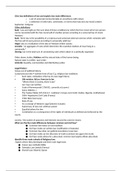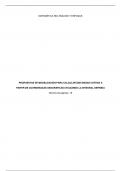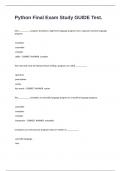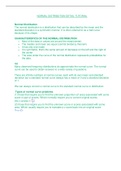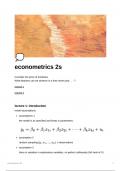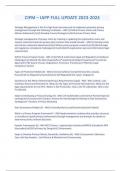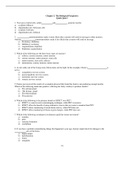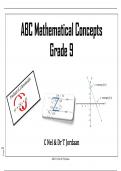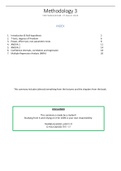o a set of universal moral principles in accordance with nature
o a collection of valid rules, commands, or norms that may lack any moral content
Sophocles’ Antigone
Other definitions
Kant: ‘Law and right are the sum total of those conditions by which the free moral will of one person
can be reconciled with the free moral will of another person according to a universal law of moral
freedom.’
Kant: ‘Strict law is the possibility of a reciprocal and universal external coercion which coincides with
the free will of every person according to universally valid law.’
Hegel: law as a realization of the idea of freedom within society
Arendts: “an aggregate of rules which determine the essential relations of man living in a
community”
Jhering: law is the total sum of constraining rules which obtain in a politically organized
Order above Justice: Hobbes and the natural state of the human being:
Natural state is conflict. Law=order
Aristotle: Equality, commutative and distributive justice
Legal History:
Grows out of political history.
Customary/oral law→ earliest form of law. E.g. religious law traditions
• Each state, civilization, tribe has its own legal history.
• Ubi societas, ibi jus: from jus to lex
“Where there is society, there is law”
Jus= law; Lex=written
• Code of Hammourabi (1760 BC, currently at Louvre)
• Solon (500 B.C.)
• The Twelve Tables 529-534 A.C.: Justinian’s Corpus Juris Civilis (Codex, Digesta, Institutiones)
• 1804: Napoleonic Civil Code (France)
• 1900: BGG (Germany)
• Rule of Law
• As a concept of Western Legal Systems includes:
• Supremacy of law over arbitrary power
• Equality before the law
• Constitution as a consequence of the rights of individuals as defined and enforced by the
courts.
society / the system of purposes and interests secured by coercive means
What are the five main differences between common and civil law?
● Common law insists on oral tradition
● Civil law insists on written law (codification of statutes)
● Common law relies om judicial precedence (case law)
● Civil law insists on the discovery of truth (common law agues the truth)
● Civil law rarely allows for a plea deal; common law largely utilizes plea deals
Identify three main schools of Religious law.
Explain where they developed and their main legal texts.
● Canon Law (catholic) Bible
● Talmudic Law (Jewish) Talmud
● Shariah Law (Islamic) Quran
,What are the two main functions of law?
♦ Maintain order
♦ Protect liberties and rights
What is Justice?
Fairness in protection of rights and punishment of wrongs.
1. Explain ‘justice’ as a function of law according to Aristotle.
Aristotle: Equality, commutative and distributive justice.
What was the Hart/Fuller debate about?
Hart: Positivist- morality and law is to be separate. Law is what we say it is.
Existence of law and content of law depends on social facts and not on its merits.
Fuller: positivist- morality is the source of law and its binding power. Law is defined by morality.
• Utilitarianism: Bentham and Rawls- Laws may be disobeyed if it doesn’t benefit the greater
good.
• Law and Morality: Must Law be Moral?
What was the Hart/Devlin debate about?
Devlin: Law must uphold society’s morality, thus should be based on it. (Law is minimum standard).
Hart: Public v. private harm. Change in moral views does not destroy society. (E.g. Homosexuality
v. perceived moral behaviour debate)
In common law systems, the judges had the powers of mandamus and quo warranto. What were
these powers and why did they exist in common law systems?
Mandamus- “we Command”; court order to act.
Quo warranto- “by what”; legal action required to show under what authority is acted
Why was Justinian’s Corpus Juris Civilis the main object of study in the first European University in
Bologna?
It was the most comprehensive and detailed written, legal work at the time.
2. A medieval student of law would acquire a J.U.D. title. What was that title about? JUD was
the title degree earned by studying both common and Canon law.
Explain the difference between the pays de droit coutumier and the pays de droit ecrit in regards
the organisation of a legal system during the emergence of a nation state.
♦ Pays de droit coutumier- Laws based on local, rural customs as practiced in northern parts of
France.
♦ Pays de droit ecrit- Roman law as practices in southern France.
Source of Law
In defining law, we identified the need to differentiate between types of norms. Many norms
tell us how to act, and not all norms belong to a legal system. Even if these norms contain
the same obligation. Ex: The prohibition of murder.
Law:
A set of rules and norms defined and enforced by an authority, and acknowledged by
society. → has a consequence tied to it.
Authority which has the power to make law.
♦ “You shall not kill.” (one of the Ten Commandments)
♦ “Any person who intentionally and with premeditation takes the life of another
person shall be guilty of murder and shall be liable to life imprisonment or a
determinate term of imprisonment not exceeding thirty years or a fine of the fifth
category.” (Article 289 of the Dutch Penal code)
, What is a Source of Law?
Authority which has the power to make law.
Most people will recognise the legal character of the prohibition of the Dutch Penal Code.
♦ Not on the basis of the content of the obligation: they are similar or the same.
♦ Not on the basis of the existence of a sanction: prison for the Dutch Penal Code and
burning in hell for eternity for the Commandment.
The key is the origin of the obligation: its source. The person or the institution that
pronounce the rule should have the authority to pronounce it.
Hence in this case, the prohibition of murder is a legal obligation because it was enacted by
the Dutch legislature (“De Staten-Generaal”), who has the authority (the power) to do so, on
the basis of the Dutch Constitution (”Grondwet”). This constitution is itself socially and
politically recognised in the Netherlands as the supreme legal norm as a matter of fact.
This view is called legal positivism, which has been the dominant legal theory for most of
the 20th century in civil and Anglo-American law.
Legislature enacts law→ has this authority on the basis of the constitution. Constitution is
socially and politically recognized as the supreme legal norm as a matter of fact.
(=undisputed).
Sources of Law as Authority
Authority is power.
An authoritative source of law is the basis of a valid (“existing”) legal obligation.
In legal arguments, lawyers look for authority.
• Ex.: What is the authority for saying that people in the Netherlands have a right to
express their opinion in the media without requiring the permission of anyone? Because
Article 7(1) of the Dutch Constitution says so.
❖ The positivists view law as a system of obligations that function as commands.
Hence, a person or an institution that claim the authority to enact legal obligations
claims
the right to be obeyed.
The ”king” (or the “president”), the “prime minister”, the “parliament”, the “mayor” have by
law some defined authority. They have the right to rule, and we, as simple citizens, have the
duty to comply.
♦ The conception of what a source of law is:
It required the ideology of the state: the idea that the state, the civil (non-religious)
government of a country, is free to regulate the relations of its citizens as it wishes. This idea
is modern. In the middle ages, power was fragmented amongst feudal “tenants” and land
owners, while the law was considered to have a divine origin by nature. The idea of absolute
sovereignty of the state grew against feudalism.
➢ Leviathan (Hobbes) monopoly of law-making. Sources of law depends on the
sovereign. There is no higher authority in this case. Back in the 17 th century, Thomas
Hobbes defended the view that a government must have absolute authority. The
power of the sovereign should be neither limited nor divided. People are scared for

